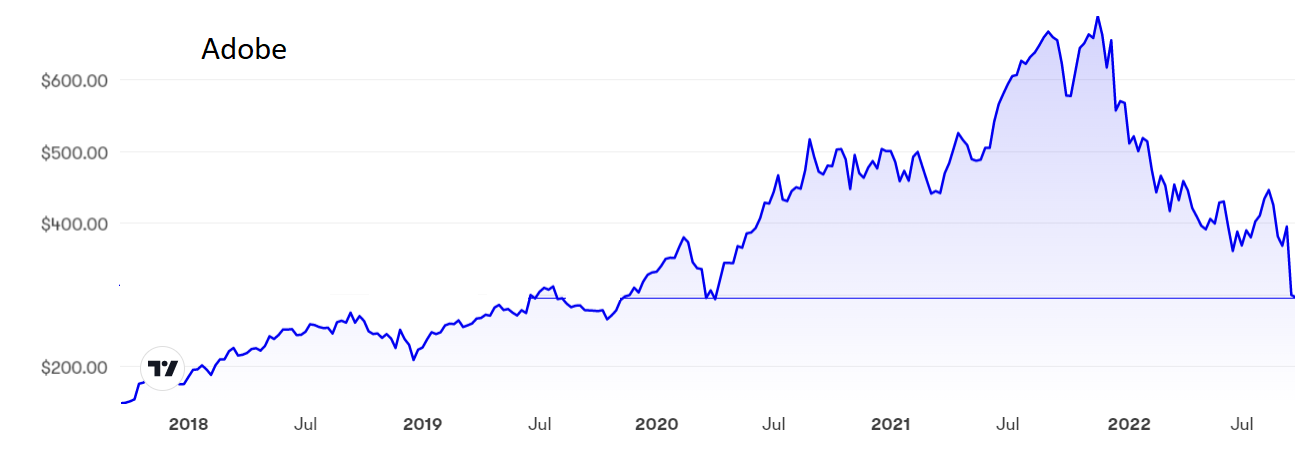Best chance to buy this software giant’s shares?
21st September 2022 08:21
by Rodney Hobson from interactive investor
Spending huge sums on acquisitions has not always gone down well, but a slump in this share price could be an opportunity, believes overseas investing expert Rodney Hobson.

When a company pays what looks to be a very full price for a major acquisition, it is obviously a matter for some concern. Investors must decide whether the acquired business will be substantially more profitable under new ownership and whether the epithet “transformational” is justified.
Graphics and multimedia group Adobe Inc (NASDAQ:ADBE) is splashing out a massive $20 billion, half in cash and half in shares, to buy digital development specialist Figma. This is not only the most expensive acquisition Adobe has made so far, it is also the most anyone has paid for a privately-owned software company.
- Discover more: Buy international shares | Interactive investor Offers | Most-traded US stocks
Adobe has built up a wide range of software over the past 40 years, but it is best known for its Photoshop product that helps with designs and can be used to enhance – some would say manipulate – images. It is clear that Figma fits well into the business and will widen the range of products that Adobe offers.
There is no secret about Adobe’s ambitious plans to expand partly through organic development and partly though buying other software companies. That ambition has not been paused during the pandemic. It bought management platform Workfront for $1.5 billion in 2020 and video platform Frame.io for $1.3 billion a year later.
Figma will add 850 staff to Adobe’s existing workforce of 28,000. It will continue to operate separately under the existing chief executive Dylan Field, who founded the company along with fellow software engineer Evan Wallace. That will allow for a smooth takeover, due to go through next year. There is no doubt that it will happen, as both sides face a $1 billion penalty if they back out in the meantime.
However, it is fair to wonder if, after four decades building Figma, Field is getting the better bargain by cashing in his chips now while he still has time to withdraw gracefully and enjoy the fruits of his labour. Adobe will sooner or later have to demonstrate that it can run the business better without him and that management has not already been overstretched by its previous acquisitions.
The expansion programme is indisputably showing through in the top line, with revenue hitting a record in the third quarter to 2 September at $4.43 billion, up 13% on a year earlier. The impact on the bottom line has been less spectacular, with pre-tax profit up 2.7% to $1.46 billion.
Despite the current tough economic circumstances, Adobe expects fourth quarter revenue to be up 10% on last year at $4.52 billion.
- Is the US a land of opportunity for trust investors?
- The sustainable funds weathering the style storm
Concerns that Adobe may have overpaid for Figma sent Adobe’s shares down 16.8% on the day it was announced, a pretty severe verdict. They have now lost more than half their peak value of $688 set last November and are languishing just below $300, a 29-month low. The collapse has been even more dramatic as was the climb from $200 at the end of 2018.

Source: interactive investor Past performance is not a guide to future performance
While much of that slump has been a reflection of the way that tech stocks generally have fallen out of favour this year, some of it is a concern that Adobe is failing to spark innovation within its own ranks and is thus forced into expensive acquisitions.
Even now the price-earnings ratio is quite demanding at around 30 and there will surely be no dividend for some years to come, so any gains for investors must come from a recovery in the share price.
Hobson’s choice: The stock is not for the fainthearted, nor is it suitable for those who value dividends, but Adobe will bounce back and strongly at that. This could be the best chance for any long-term investor looking for tech stocks to get in. I would not pay more than $300 and it may be wise to wait until the share price bottoms out.
Rodney Hobson is a freelance contributor and not a direct employee of interactive investor.
These articles are provided for information purposes only. Occasionally, an opinion about whether to buy or sell a specific investment may be provided by third parties. The content is not intended to be a personal recommendation to buy or sell any financial instrument or product, or to adopt any investment strategy as it is not provided based on an assessment of your investing knowledge and experience, your financial situation or your investment objectives. The value of your investments, and the income derived from them, may go down as well as up. You may not get back all the money that you invest. The investments referred to in this article may not be suitable for all investors, and if in doubt, an investor should seek advice from a qualified investment adviser.
Full performance can be found on the company or index summary page on the interactive investor website. Simply click on the company's or index name highlighted in the article.
Disclosure
We use a combination of fundamental and technical analysis in forming our view as to the valuation and prospects of an investment. Where relevant we have set out those particular matters we think are important in the above article, but further detail can be found here.
Please note that our article on this investment should not be considered to be a regular publication.
Details of all recommendations issued by ii during the previous 12-month period can be found here.
ii adheres to a strict code of conduct. Contributors may hold shares or have other interests in companies included in these portfolios, which could create a conflict of interests. Contributors intending to write about any financial instruments in which they have an interest are required to disclose such interest to ii and in the article itself. ii will at all times consider whether such interest impairs the objectivity of the recommendation.
In addition, individuals involved in the production of investment articles are subject to a personal account dealing restriction, which prevents them from placing a transaction in the specified instrument(s) for a period before and for five working days after such publication. This is to avoid personal interests conflicting with the interests of the recipients of those investment articles.